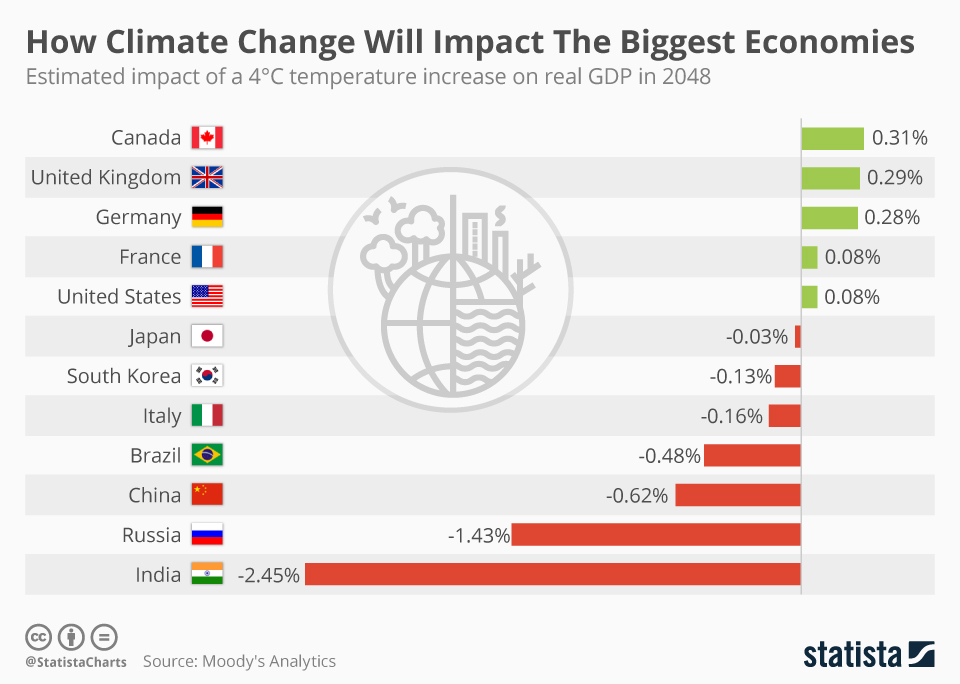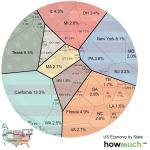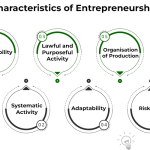The economic impact of climate change poses a formidable challenge, as recent studies reveal projections that dramatically outpace previous estimates. A growing body of research suggests that every 1°C increase in global temperature could lead to a staggering 12% loss in overall GDP, translating into significant economic strain worldwide. As economies grapple with the rising costs of climate change—ranging from agricultural losses to infrastructure damage—the repercussions on productivity and spending cannot be overlooked. The economic forecast regarding climate change becomes even more alarming when considering the long-term effects, as projections indicate a potential decline in output and consumption could mirror the devastation seen during the Great Depression. Amidst these troubling predictions, the potential benefits of decarbonization offer a glimmer of hope for mitigating these economic consequences, highlighting the urgent need for strategic policy interventions to tackle climate change head-on.
The financial repercussions of environmental shifts, often referred to as the fallout from climate change, have become increasingly critical in shaping global economic discussions. Recent analyses depict a concerning scenario where the predicted loss of GDP due to rising temperatures could severely impact both national and global economies. As we evaluate economic forecasts linked to climate transformation, understanding the broader implications, such as heightened costs associated with extreme weather and its effect on various sectors, becomes essential. Alternative viewpoints highlight that while climate-related challenges pose significant risks, pursuing agendas that embrace sustainable practices and decarbonization can simultaneously yield positive economic outcomes. Hence, reimagining our approaches in light of these challenges could unlock untapped potentials while minimizing the adverse effects associated with climate-induced economic disruption.
The Economic Impact of Climate Change
The economic impact of climate change is a pressing concern that continues to gain traction among economists and policymakers alike. According to recent studies, the potential GDP loss due to climate change can reach alarming levels, with estimates suggesting a staggering 12% decline for each additional 1°C rise in global temperatures. This projection stands in stark contrast to earlier predictions, which underestimated the severity of climate change’s economic toll. As global temperatures rise, countries face not only immediate financial repercussions but also long-term ramifications that can alter their economic landscapes significantly.
Adaptation and mitigation strategies will therefore be critical in addressing these effects. Nations that fail to recognize the cost of climate change risk finding themselves in precarious positions economically. The analysis indicates that if temperature increases continue unabated, the world could experience a catastrophic reduction in output and consumption—projected to be as severe as a 50% drop in the case of a 2°C rise. This demonstrates not just an environmental crisis but a significant economic threat, urging governments to act swiftly to implement carbon reduction policies and invest in sustainable technologies.
High Stakes of Climate Change Projections
Climate change projections are becoming increasingly urgent as researchers refine their models to reflect more accurate scenarios. A key aspect of these projections is the relationship between rising temperatures and economic forecasts for various countries. Advanced methodologies now enable economists to tie temperature changes directly to GDP outcomes, highlighting the severe risks nations will face if global warming is not curbed. The disconnect between previous economic predictions and recent findings underscores the critical need for updated climate strategies that account for these enhanced projections.
Moreover, the implications of miscalculating climate change impacts extend beyond economic frameworks. They can affect public policy, investment in green technologies, and international cooperation on emissions reductions. As these projections indicate a sixfold increase in predicted economic losses, it’s crucial for stakeholders to integrate this knowledge into their planning. The interplay between environmental science and economic policy thus not only informs better practices but also galvanizes efforts for comprehensive action against climate change.
Cost of Climate Change: A Dire Reality
The cost of climate change is far greater than many initially believed, with researchers now estimating it at approximately $1,056 per ton of carbon emissions. This figure is crucial for policymakers who must navigate the economic calculus of implementing effective climate interventions. It starkly contrasts with other estimates, which relied on outdated methodologies yielding a mere $185 per ton. Understanding this discrepancy is essential for making informed decisions about the social cost of carbon and shaping effective regulatory frameworks.
This clarity on the cost also facilitates comprehensive discussions on decarbonization benefits. As the evidence mounts, the potential economic growth from transitioning to a low-carbon economy is significantly highlighted. Policymakers can better articulate the fiscal reasons for investing in renewable energy sources and reducing emissions, knowing that such actions ultimately protect not only the environment but also the economy.
Decarbonization Benefits: Economic Growth and Sustainability
Decarbonization benefits extend beyond environmental advantages; they’re increasingly recognized as fundamental to fostering economic growth. The recent analysis indicates that while the global economy might face erosion due to climate change, deliberate actions towards reducing carbon emissions can yield significant long-term benefits. Not only does decarbonization help mitigate the adverse effects of climate change, but it also promotes innovation and job creation in budding industries focused on sustainability.
Moreover, the cost-benefit analysis from this new research shows that decarbonization strategies are economically viable for significant economies like the U.S. and the EU. This presents a compelling argument for governments to push forward with aggressive climate policies, emphasizing that the financial benefits of transitioning to cleaner energy sources outweigh the costs. As nations strive to decouple economic growth from carbon emissions, understanding the economic forecast amidst climate change enhances the case for urgent action.
The Role of Technological Advancements in Climate Economics
Technological advancements play a pivotal role in shaping the economic response to climate change. As seen in the latest findings, while growth continues, it is necessary for these developments to align with emissions reduction goals. The interplay between technological innovation and climate economics is critical as it determines not only how countries adapt to changing conditions but also how effectively they can mitigate future risks. For instance, advancing renewable energy technologies can lessen dependency on fossil fuels, directly impacting the cost of climate change.
Furthermore, investment in technology like carbon capture and storage can transform high-emission industries into sustainable practices. This shift not only aids in meeting climate commitments but also provides avenues for economic resilience in the face of climate challenges. Thus, the bidirectional relationship between climate change and technology must be acknowledged as countries work towards a cleaner, economically sustainable future.
Global Cooperation: Addressing Climate Change Economically
Global cooperation is essential in effectively addressing the economic ramifications of climate change. The interconnectedness of the global economy means that climate impacts in one region can have far-reaching effects elsewhere. Thus, coordinated international efforts on emissions reductions and climate finance are vital, as they can mitigate the GDP losses projected in emerging economies particularly vulnerable to climate fluctuations. Climate agreements and partnerships can lead to more significant financial resources dedicated to combating and adapting to climate change.
Additionally, such collaboration can pave the way for sharing technologies critical for sustainable development across borders. This unity not only enhances economic stability in an uncertain climate future but also fosters a shared commitment to preserve our environment. Investing in global partnerships is not merely prudent—it’s a critical strategic necessity for ensuring that all nations can navigate the economic challenges posed by climate change successfully.
Implications for Policy-Makers: Steering Economic Resilience
For policymakers, the implications of these findings are profound. The clear evidence showing projected GDP losses necessitates a reassessment of priorities at both national and global levels. Efforts must now focus on integrating climate considerations into economic planning, ensuring that climate change impacts are effectively addressed in budget proposals and legislative frameworks. By acknowledging the economic forecast due to climate change, policymakers can better prepare and allocate resources towards adaptation strategies that promote resilience.
Furthermore, it is crucial for policymakers to engage with scientific communities and economists to develop robust frameworks that support green technology investments and emission reduction initiatives. Consequently, this integrated approach can safeguard against future economic losses while inspiring economic growth amidst climate uncertainty. Evolving policies to incorporate climate science and economic realities is not just advisable—it’s essential for achieving long-term economic sustainability.
Economic Forecasting Amidst Climate Change
Economic forecasting has become increasingly challenging as the effects of climate change become more pronounced. The need for accurate models capable of incorporating climate variables into economic predictions is paramount for future planning. As evidenced in the findings of the latest research, traditional models that downplay the impacts of global warming can lead to serious underestimations of potential economic harm. Thus, economists must evolve their methodologies to reflect the current realities and forecast the implications as accurately as possible.
These advanced forecasting techniques not only bolster economic models but also provide clarity for stakeholders making crucial investment decisions. As climate change projections indicate severe risks to GDP, understanding the potential financial implications can guide governments, businesses, and investors towards more informed choices that emphasize sustainability and economic stability.
Long-Term Economic Strategies for Climate Change Adaptation
Long-term economic strategies for climate change adaptation must emphasize resilience and sustainability. As projections indicate severe economic disruptions linked to rising temperatures, it becomes vital for countries to develop frameworks that enhance their capacity to respond effectively. This includes investing in infrastructure that withstands extreme weather events and promoting sectors that can thrive in a lower-emission economy.
Furthermore, these strategies should incorporate community engagement and stakeholder participation, ensuring that voices from diverse sectors are included in the planning processes. By developing comprehensive adaptation strategies, nations not only prepare to handle the immediate effects of climate change but also position themselves for future economic growth and stability in an uncertain climate landscape.
Frequently Asked Questions
What is the economic impact of climate change on global GDP?
Recent studies indicate that the economic impact of climate change on global GDP is far more severe than previously estimated, with projections suggesting a 12% loss for every additional 1°C rise in temperature. This underscores the urgent need to address the cost of climate change and its potential long-term effects on the economy.
How does climate change affect economic forecasts and growth projections?
Climate change has a profound effect on economic forecasts, as it has been shown to lead to significant declines in productivity and consumption. The latest research predicts a 50% reduction in output and consumption if global temperatures rise by an additional 2°C by the end of the century, highlighting the importance of incorporating climate change projections into economic planning.
What are the potential costs associated with decarbonization in relation to climate change?
Decarbonization measures are increasingly demonstrated to pass cost-benefit analyses, especially in large economies like the U.S. and the European Union. The estimated social cost of carbon has been recalculated to $1,056 per ton, which contrasts sharply with the costs of federal decarbonization measures, showcasing that investing in decarbonization can mitigate the economic impact of climate change.
How significant are current climate change projections regarding economic losses?
Current climate change projections project economic losses significantly larger than previous estimates, with a potential GDP loss of up to 12% for every additional 1°C of warming. This highlights the serious economic ramifications of climate change and the urgency for policymakers to act.
What is the relationship between climate change and extreme weather events affecting the economy?
There is a strong correlation between rising global temperatures and increased instances of extreme weather events, which adversely impact capital and productivity. These disruptions pose a challenge for the economy, making it essential to understand the economic impact of climate change in terms of both immediate and long-term effects.
How do changes in temperature relate to economic productivity losses?
Research shows that every additional 1°C increase in global temperatures results in significant productivity losses, projected at around 12% decline in GDP. This relationship indicates that the cost of climate change is not just environmental but deeply economic, affecting livelihoods and national outputs.
What are the long-term economic implications of rising global temperatures on future generations?
If global temperatures continue to rise, the long-term economic implications could be dire, with projections suggesting output and consumption could decline by 50% if warming reaches 2°C above pre-industrial levels, representing potential economic conditions worse than the Great Depression.
What is the social cost of carbon, and why is it significant in economic terms?
The social cost of carbon quantifies the economic damages associated with a rise in carbon emissions, estimated recently at $1,056 per ton. This figure is significant as it informs policymakers about the economic implications of climate change, aiding in the analysis of the cost of climate change and the financial justification for decarbonization efforts.
| Key Points |
|---|
| Recent study indicates the economic toll of climate change is six times higher than previous predictions, estimating a 12% loss in global GDP for each additional 1°C rise in temperature. |
| The economic effects of climate change will peak six years after the temperature increase, highlighting the immediacy of economic impacts. |
| A comparison of temperature rises suggests a potential 50% reduction in output and consumption by the century’s end if temperatures increase by an additional 2°C. |
| The social cost of carbon is significantly higher than previous estimates, with findings of $1,056 per ton globally compared to $185 per ton based on local temperature variations. |
| Decarbonization measures are cost-effective and beneficial for large economies, easily passing cost-benefit analyses. |
Summary
The economic impact of climate change has been profoundly underestimated in previous studies. Recent research emphasizes that each additional degree of warming threatens to inflict a staggering 12% reduction in global GDP, translating to monumental costs that compound directly with rising temperatures. Moreover, with projections that an increase of just 2°C could result in a 50% decline in output by the end of the century, the urgency for effective decarbonization policies has never been more critical. As compelling as the statistical forecasts may be, they serve not just as a call to action for policymakers but also as a vital lens through which to view the immediate and long-term ramifications of our climate choices.







